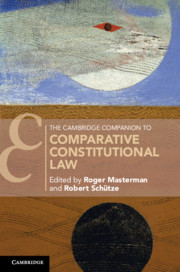‘This collection of analytic essays on topics ranging from institutions of governance to concepts central to constitutionalism provides a fine introduction to the state of the field.’
Mark Tushnet - William Nelson Cromwell Professor of Law, Harvard University
‘We have entered the golden age of comparative constitutionalism. The digital revolution has made foreign legal sources more easily accessible, modern advances in transportation have made the world smaller, and scholarly collaborations across borders have pushed the boundaries of our knowledge. And yet many fundamental questions in comparative constitutionalism remain contested or even unanswered: how to compare, what to compare, and more importantly why to compare? Masterman and Schütze have assembled an all-star team of leading authorities in the study of constitutionalism to guide both experienced scholars and new students through the most important inquiries in the field. The future of public law is comparative, and this outstanding volume will be an invaluable resource for understanding the stakes and challenges that await.’
Richard Albert - William Stamps Farish Professor of Law, University of Texas, Austin
‘This Cambridge Companion to Comparative Constitutional Law stands out for its in-depth pursuit of well-selected themes. It offers the scholar and student an authoritative account of the theoretical foundations and historical foundations of global constitutionalism, as well as its core principles, institutions and dynamics.’
Adrienne Stone - Redmond Barry Distinguished Professor, University of Melbourne
‘In times of flourishing comparative constitutional law studies, this Cambridge Companion addresses the main issues in the field, with a view to orient scholarly approaches towards systematic comparative work. In an ever more connected world, such stimulating enterprise will enhance the comprehension of the challenges at stake, as well as the communication among different methodologies and theories.’
Cesare Pinelli - Sapienza - Università di Roma
‘This Companion assembles a remarkable cast of leading scholars on comparative constitutional law. The chapters adopt a panoramic view in interrogating the field from its theoretical and historical foundations through to its present-day significance. This Companion is an important and valuable contribution on a subject of ever-growing significance.’
George Williams - Dean and Anthony Mason Professor, University of New South Wales
‘Combining magnitude and accuracy, here is a new instrument, original in its design, as complete as possible, which will allow any reader to satisfy his curiosity by measuring the importance and interest of this new scientific field. Here is a book that makes it possible to understand better, at the time of globalization, the stakes of a comparative confrontation between the main modes of constitutional arrangement in the world.’
Vlad Constantinesco - Université de Strasbourg
‘The essays are well grounded, nicely written, and fair in their legal-political arguments. Together they constitute a good picture of where the world now stands with respect to constitutionalism.’
S. N. Katz
Source: Choice



